Our document archival feature streamlines the process of sending form-related templates and files to EPC, enhancing document management efficiency.
How It Works:
Upon the feature’s activation in a form, a new folder is automatically created within the specified EPC document folder or set. This new folder, timestamped with the date and time of creation for easy reference, contains the generated form template along with any attached files.
- Additionally, if configured for archival, the reference ID will be used to uniquely identify the newly created folder.
p(banner tip). Please note that the archived template includes any digital signatures provided during the workflow.
How to Implement:
To implement this feature, users simply need to utilize the following code snippet:
var errors = new List<string>();
if (bpmAppService.BPMSServices.EPCService.Login(out errors))
{
bpmAppService.BPMSServices.EPCService.ArchiveTemplateWithAttachments("EPCFolderID", new List<string> {domainObject.FileAttachmentAttribute}, domainObject.ReferenceID);
}Scenarios & Customization:
This feature can be adapted to various scenarios, offering flexibility in its application. For instance:
- Activation Within Form Interface: Users can trigger the feature directly within the form interface by linking the provided code to a button control.
- Activation Upon Form Submission: Users can trigger the feature upon form submission by integrating the code into a post-form action.
Users can further enhance the feature’s functionality through customization options, including:
- Incorporating Additional Business Logic: Users can tailor the feature to their workflow requirements by incorporating additional business logic into the code. This includes defining conditions for archival and specifying different destination locations based on specific criteria.
- Template File Name Customization: Leveraging the File Name Info Template field in the Form Behavior Properties window, users can dynamically rename the template file based on form attributes.
- For example: Quality Event Report – $QualityEventTitle




